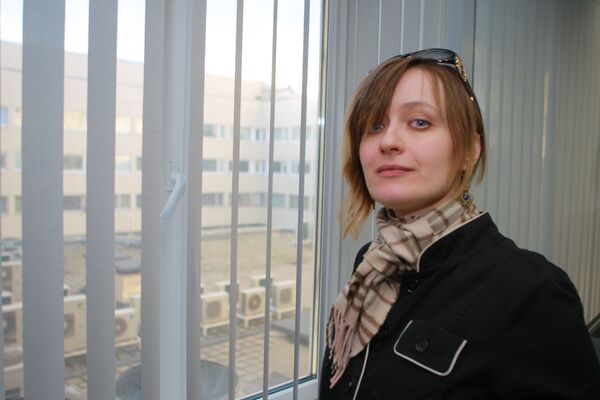Foreign visitors to Russia tend to complain about the same things: bureaucracy, bad roads, and a conspicuous lack of smiling faces.
The first two issues are addressed regularly in the Russian media. They are also routinely moaned and screamed about by normal folk going about their day.
But the third issue? Not so much.
I spent most of my life in North Carolina - a place where smiles are a kind of social currency. Even as someone who speaks Russian fluently and generally feels as though she “fits in” in Moscow to a great extent, I am still taken aback by the fact that Muscovites don’t smile when they greet you (hosts at hugely expensive restaurants notwithstanding - and anyway, I’m a real person living on a real income, I can never afford those places anyway). I’m not used to it, and perhaps I’ll never get used to it. It feels like a slight - if you’re used to the fact that smiling is the polite thing to do.
Still, I can’t help but chortle inwardly whenever I see visitors to Russia trying to “explain” this phenomenon away.
“Russians had 70 years of communism! They dealt with Stalin’s terror! They lost millions of people in WWII! Of course they aren’t going to smile for you!”
The implicit idea is that the lack of smiles is tied to depression over historic events. And while this may be true for some people, the overwhelming majority are just going along with a social custom. And the roots of that social custom are more complicated than “communism” and “ZOMG Stalin.”
An old Russian saying goes like this: “Laughter without cause is a sign of foolishness.” It sounds better in Russian, obviously. Mainly because it rhymes.
In order to understand what this truly means for Russian society - you have to go back to the origins of the word “fool.” The word, in context, doesn’t just mean a silly person. It means someone who is outside the mainstream - either someone who is very eccentric, or someone who is mentally ill.
The history of the Russian smile would certainly make for an interesting book topic. For now, my own research suggests that connecting smiles with mental illness may have something to do with the role of medieval jesters in Russian history. Jesters were both entertaining and ominous figures - and their work employed a great deal of “abnormal” behaviour. Jesters commented on current events and politics via an exaggerated, often obscene manner.
Another Russian tradition involves the holy fools, of course, or “blessed fools” - people whose intense commitment to the Christian religion crossed out all or most social norms. They were both revered and feared - and their presence remains visible in Russia today. When these people smile, it is interpreted as a reflex caused by their close connection to heaven.
Outside the historic and religious context, the Russian smile is a rare, but genuine phenomenon. It is meant to be sincere, regardless of the social situation at hand (whether you’re smiling to express warmth and affection, or smiling sardonically, or smiling bittersweetly - you do it in a way that shows you mean it) and an insincere smile is derisively labeled as a dezhurnaya - a.k.a. dutiful - smile.
In one of the greatest memoirs of the 20th century, The Story of a Life, Soviet writer Konstantin Paustovsky once noted the practice of “smiling only with [your] eyes” in reference to the captain of a doomed vessel he met on the Black Sea coast during WWI. Though this practice is very rarely talked about, I can attest to the fact that it is very widespread in modern-day Russia. You just have to pay attention - and not rely on whatever social norms you may have learned elsewhere.
The views expressed in this article are the author's and do not necessarily represent those of RIA Novosti.
Trendwatching in Russia is an extreme sport: if you’re not dodging champagne corks at weddings, you’re busy avoiding getting trampled by spike heels on public transportation. Thankfully, due to an amazing combination of masochism and bravado, I will do it for you while you read all about it from the safety of your living room.
Natalia Antonova is the deputy editor of The Moscow News. She also works as a playwright – her work has been featured at the Lyubimovka Festival in Moscow and Gogolfest in Kiev, Ukraine. She was born in Ukraine, but spent most of her life in the United States. She graduated from Duke University, where she majored in English and Slavic Literature. Before coming to Moscow, she worked in Dubai, UAE and Amman, Jordan. Her writing has been featured in The Guardian, Foreign Policy, Russia Profile, AlterNet, et al.
Trendwatcher: In the Zone for Euro 2012
Trendwatcher: Old Farts & Pointless Papers
Trendwatcher: “Slumming it” at Moscow’s Jean-Jacques
Trendwatcher: Vacation time for Ugly Americans (and Brits, and Russians)
Trendwatcher: Where the Grass is Green and the Girls are Pretty
Trendwatching: The Unbearable Lightness of Being a Russian Pilot
Trendswatcher: Of Parking and PR Disasters
Trendswatcher: So an Ax-Wielding Maniac Walks into Court...



